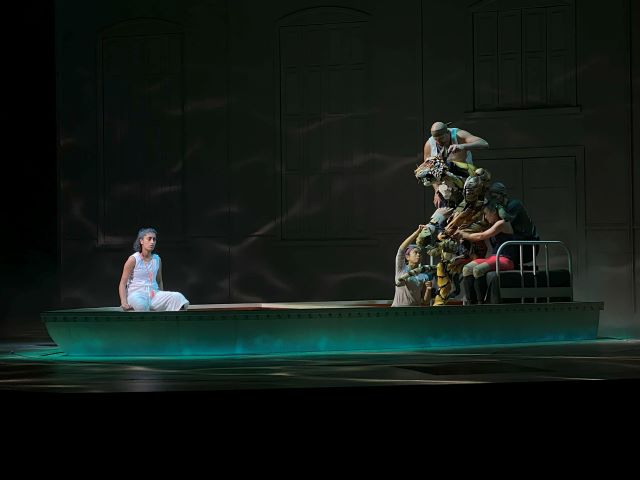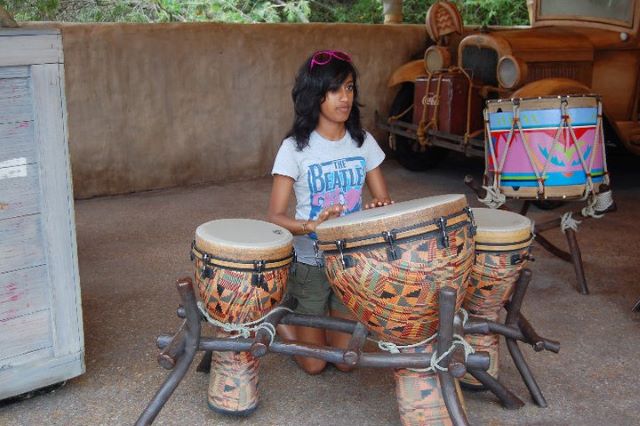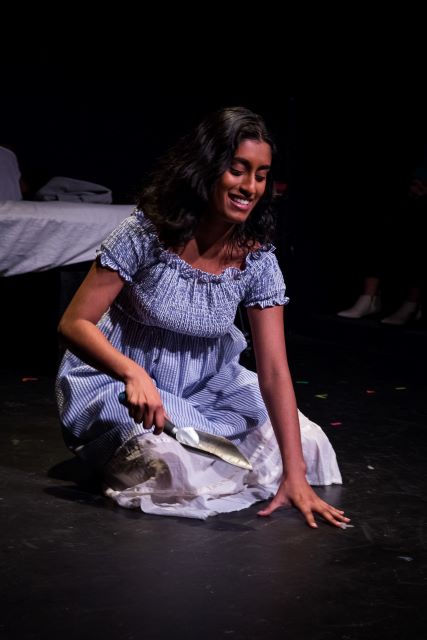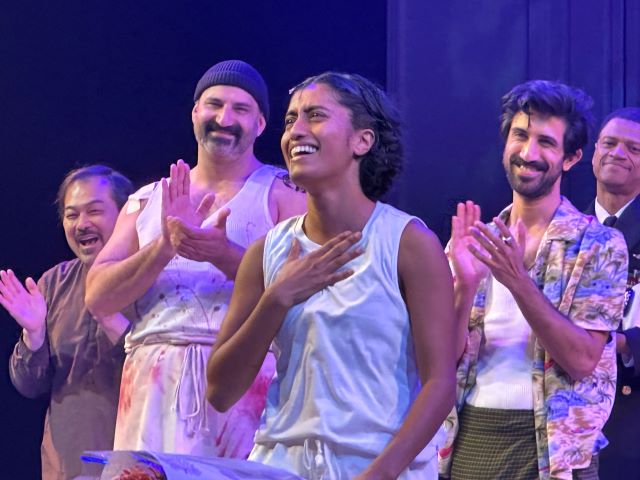Uma Paranjpe – How a Broadway Star Was Born
Gender Bender: Meet the first female Pi in ‘Life of Pi’ on Broadway!

[dropcap]Y[/dropcap]ou’ve all heard of ‘Life of Pi’, the classic book by Yann Martel, which was adapted for the theater – London’s West End and for New York’s Broadway by playwright Lolita Chakraborti. The play had a successful run on Broadway, winning three Tonys. In its closing days, there’s a new buzz about it, a real gender bender – the part of Pi is now being played by a female actor – Uma Paranjpe!

[dropcap]N[/dropcap]ow, how did this happen? How did Broadway make such a sweeping change and is gender yet another hurdle to fall when actors audition for roles?
Meet Uma Paranjpe who got her big break on the Broadway stage, making her debut with the role of a lifetime.
“The fun part is that from the beginning there was a possibility that Pi would be a woman,” she says, explaining that in the UK, the role was played by two male actors, and their understudy was female, the only age-appropriate person available. The female understudy got her chance when both Pi performers were out and her performance garnered a lot of attention in the UK. So when they brought The Life of Pi to the US, they were more purposeful about it and always planned to have a woman Pi for some of the performances. Currently Uma Paranjpe, who was earlier in the ensemble cast of Pi, is playing the main lead of Pi from July 11 right to its closing on July 23. After a break she may be performing the role of Pi in the touring production in 2024.

[dropcap]S[/dropcap]o in a world of Indian doctors and engineers and accountants, how did Uma decide to become an actor?
“I’ve wanted to do this my whole life. I’ve always liked to entertain,” she says: “My parents started me in piano lessons when I was six years old. So I’ve been performing, doing musical performance for a long time. I started playing the drums when I was about 11.”

[dropcap]U[/dropcap]ma spent her high school years involved with the band and musical performances. Acting was not offered in her high school but when she was applying for college, a whole new world of possibilities opened where a career in the arts could be possible. “My parents always supported me in my artistic life but they made it very clear that it was just a hobby, and I needed to study something that was a little bit more serious.”
When she was in her final year of high school, she heard of the California State Summer School for the Arts, and applied. She was accepted, she begged and pleaded to go and her parents said yes. She says, “I was actually the only Indian person in the acting program, and I think in the entire school of 300, there were about three other Indian students in writing, music and dance.”

[dropcap]T[/dropcap]his was just a month long program but after that Uma had to make some hard choices. At a college fair she learned there were entire colleges where you could study theater, and that it could be a viable career. She says, “I had no idea. So I said, this is what I want to do. I’m really inspired by it. I think I’m good at it too. And my parents, to their credit, saw my passion.” She got into 11 or 12 colleges for acting including NYU’s Tisch School of the Arts. Finally she chose the University of Miami where she received a scholarship to join their musical theater program.
Uma graduated in 2018 but being the daughter of parents who both were techies and really believe in education, she in addition pursued a double minor in psychology and business management. Meanwhile she also applied for internships at theatre companies in the city and got hired at the Atlantic Theatre Company. She recalls, “I had a lot of fun working in their education department. I learned a lot, I networked a lot.” After school, she was offered a job by the company and started her new life in Brooklyn, New York.

[dropcap]U[/dropcap]ma came to New York in search of her theater dreams but had to support herself by teaching acting and singing, tutoring for young kids. She says, “I did a lot of it, I did a lot of auditioning. That’s the thing. This was years and years in the making. Obviously COVID threw a wrench in a lot of things. But what I ended up doing for a majority of my time was finding ways to keep myself inside of the theater community at all times, no matter what I was doing.”
Persistence was the key. Working at the Atlantic Theater Company, she was able to go to a lot of off-Broadway and Broadway shows as well as to networking events. She was learning about the industry, connecting with Asian creatives and also teaching in summer camps and outreach programs, working with other nonprofits.
“I was just auditioning and auditioning and auditioning and finding a lot of things on my own,” she recalls. “I was just really making it a job to look for a job.”

[dropcap]I[/dropcap]n the beginning she did not know anyone attached to the ‘Life of Pi’ – but she had the support of her theater community. She says, “It was my community that I had built up over the years of being in New York that helped me to prepare for that. I didn’t have an apartment at the time and it was my community that let me sleep on their couches. It was my community that found me an acting coach to prepare me for these auditions. And it was my community who celebrated me when I finally booked the role.”
Uma credits her success with being in the right place at the right time, with the right amount of support from the people who had become her community in New York.
[dropcap]T[/dropcap]he Life of Pi is emotionally and physically a lot of work and requires a lot of focus for long periods for her character is on stage the entire time and it takes a lot of energy. As she points out, “So the challenge has been in really making sure that my story is clear and that comes from a lot of study and a lot of work in technique and craft and that’s where I go back to my education and my training to keep myself focused in that way.” Physically, Uma, who ran the Brooklyn Half Marathon last year, is a runner and does personal training to keep fit for her demanding role
Uma Paranjpe’s Broadway debut as Pi Patel in Life of Pi
[dropcap]S[/dropcap]o what happens when Life with Pi closes? Uma is planning to teach again, as education is another passion. She and her writing partner are working on a screenplay which they hope to get made soon. She says, “I’m kind of pushing in all directions, and making sure that my name is out there, because I love to work in theater, and I hope to do a lot more work in theater after Pi closes.”
Finally, what has been the most memorable moment for an unknown actor who in her debut shot to the lead role on Broadway? When she got that call, she says it was scary and she had a whole day to come to terms with it.
Then a wonderful thing happened: “At the very beginning of the show, just hearing the audience come in and buzzing and when I came out for my first entrance, there was applause and that was so magical. I realized a lot of people that I loved were in the space and they were all as excited for me as I was. I let it wash over me and energize me and it was really magical. It’s unlike anything that I’ve ever experienced.”

